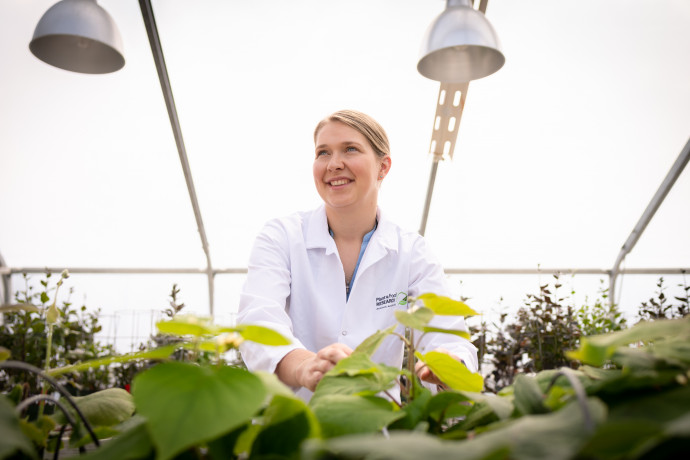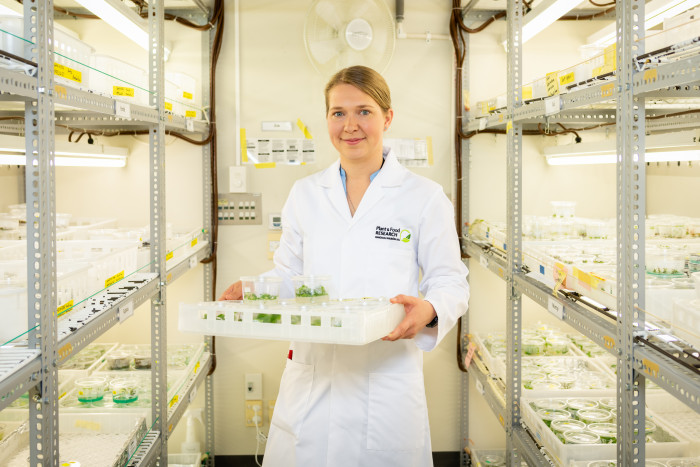Dr Sarah Moss

Sarah's passion for plants stems from her high school years. Now she's a scientist at Plant & Food research specialising in kiwifruit colouring, and the co-chair of the Early Career Researcher Forum.
Q: What got you started into your research?
A: My love of plants started in high school, I attended a high school that had a horticultural class, and I worked in a garden centre on weekends. In my final year of high school we did an assignment on gene technologies and golden rice, transitioning my interest more from a horticultural aspect to plant molecular biology. During my undergraduate degree I studied both horticulture and molecular biology, focusing on plant biology at Massey University in Palmerston North and I really loved it. I managed to get a summer studentship role at Plant & Food Research between my second and third year of my undergraduate degree. I think all of these things combined got me into research.
The first summer studentship was followed by two more, and then a Masters based at Plant & Food Research, through The University of Auckland, on kiwifruit flowering. I moved to Australia to do my PhD on grape berry development based at CSIRO and The University of Adelaide, and then returned to New Zealand for a Post-Doctoral role with Plant & Food Research working on Snapdragon flower colour before starting my current role in July 2019. I now work on kiwifruit colour, which is a great mixture of my previous research topics.
Q: Did you always know you’d get into research?
A: I knew at the age of 15 that I really wanted to study plants, however it took until my second year of my undergraduate degree to really determine that plant molecular biology, with a focus on plant development was exactly what I wanted to work on. I did my Masters instead of honours as I wasn’t sure if I wanted to go down the track of doing a PhD, but after working as Research Associate for a year after my Masters I realised I needed to do a PhD to conduct research at the level that would challenge me the most and take me to where I wanted to go in my career.
Q: Can you elaborate on your current mahi with kiwifruits?
A: We are investigating the genes that are responsible for making red kiwifruit red. The red pigments in kiwifruit are called anthocyanins, and they are formed by a pathway called the phenylpropanoid pathway.
We are focusing on understanding the phenylpropanoid pathway in kiwifruit and how it is regulated. We use a range of different techniques including sequencing all of the gene expressed at points throughout fruit development to see which ones might be the most important, and then use molecular techniques to investigate the specific function of these genes in influencing the levels of pigments that accumulate.
A Plant & Food Research team in Auckland have created fast-flowering kiwifruit, which are a great research tool that I am about to start using in my functional work.
All of this research can then be used to inform conventional breeding strategies. Once you know what genes are important in producing colour, you can develop markers for screening thousands of seedling plants. This means you only keep the plants that look like they have the best chance of having the traits, such as colour, that you want.
Q: Why do you do what you do?
A: I really love plants, they provide us with oxygen, they feed us and they boost our mental health.
I think it is important to do research which will directly benefit New Zealander’s through boosting the Horticultural Industry and helping to supply us with high quality fresh produce. I love working at a Crown Research Institute as we span the gap between doing really interesting science and having an impact on and for New Zealand.
Q: Why do you think the New Zealand horticultural industry is so important?
A: In 2019, produce from the New Zealand’s horticultural industry reached an estimated $9.5 billion dollars, which includes $6.2 billion of exports. This money helps to boost the New Zealand economy and helps to support a lot of jobs within New Zealand. When we send top quality produce to export markets we can be seen as a key player in providing healthy food for the world.
It also provides New Zealander’s with fresh fruit and vegetables, for our ‘5+ A Day’! I think everybody noticed during the COVID-19 lockdown, primary production (which includes horticulture) was an essential service. It was very important that the industry kept going so we could be fed and New Zealand could try to be in the best financial position possible going forward.

Q: What findings have you made that have shocked or amazed you?
A: Sometimes it’s just amazing when things work. It’s extremely rewarding when an experiment you have planned for a long time works as expected, more often than not there is a lot of troubleshooting involved. The linear model of a question to an answer rarely exists in research, so you often go on a bit of an adventure along the way.
During my PhD I was looking at different proteins that can interact with each other, but are very specific about which ones they interact with. I used a technique called bimolecular fluorescence which tags two proteins of interest each with half of a molecule that is able to fluoresce. If the two proteins are present in the same location in a cell, and interact, then you see fluorescence. In one instance, one cell I looked at had proteins interacting in the nucleus (where all of the DNA is located) but the fluorescence pattern looked like a smiley face. It was a bit of a surprise to see my research smiling back at me!
Q: Are you a big fan of house plants?
A: Yes I do love house plants, when I worked at a garden centre I was coming home with something new most weekends. I’ve been slowly building my collection back up since moving back to New Zealand from Australia.
Q: How will your research bring us closer to a more sustainable future?
A: I’m hoping that my current and future research will bring us closer to a more sustainable future by aligning with the United Nation Sustainable Development Goals, which New Zealand has signed up for. Plant & Food Research is doing a lot of work in many of these research areas. This includes contributing to growing the New Zealand economy through the breeding of new cultivars of fruits and vegetables that grow efficiently and are nutrient dense to ensure the health and well-being of the people who consume them. And also making sure that we are using responsible growing practices that won’t degrade our environment.
I personally can also advocate for other sustainable goals, such as gender equality and reducing inequalities.
Q: You’ve recently become a Co-Chair of the Royal Society Te Apārangi Early Career Researcher Forum. Congratulations! Why do you hope to achieve in this position?
A: Yes, it’s a really exciting role. There are a range of challenges that Early Career Researchers face including the lack of job security, the high value placed on overseas experience (which is particularly difficult at the moment), and the financial cost of having studied for so long. So in general I want to advocate for Early Career Researchers and highlight these issues with key stakeholders.
I would like to work on ensuring that students are made aware of the different career pathways available to them, including in universities, Crown Research Institutes (CRIs), private companies and government, to help get students interested and trained for the jobs we will have available in the future. I would like to work towards setting up official mentorship programmes and support networking events between key stakeholders, employers and early career researchers.
I want to advocate for diversity in research, encouraging and supporting Māori and Pacific peoples and women getting into research and help to ensure they have support throughout their careers to ensure the research community better represents the diversity of our community as a whole.
Research careers are filled with both opportunities and challenges, I want people to know that although it’s not always an easy road it’s extremely rewarding, you meet a lot of really interesting people, you get to always keep learning and it’s a great way to make a difference.
For more
Catch Sarah in the free-to-download 'Tūrama: Aotearoa's Early Career Researchers' digital booklet, will be released in Āperira April 2021.
Dr Sarah Moss
I want people to know that although it’s not always an easy road it’s extremely rewarding, you meet a lot of really interesting people, you get to always keep learning and it’s a great way to make a difference.
